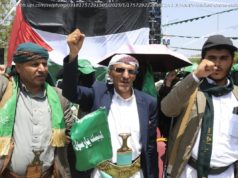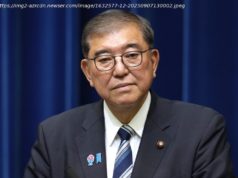His assertion that President Trump knew in advance about his campaign’s June 2016 Trump Tower meeting won’t stand up in court without corroboration.
If substantiated, Michael Cohen’s new assertion—that Donald Trump knew in advance about a 2016 meeting at Trump Tower with Kremlin-connected individuals—would prove that the Trump campaign sought to aid a Russian-influence operation aimed at putting Trump in office.
But Cohen’s word on its own is not enough to prove anything.
“A Cohen assertion by itself is not hefty evidence. If he made a note of it, if there’s a tape, if there’s a second, third, or fourth person who can corroborate, then it starts to look like evidence,” said John Barrett, a law professor at St. John’s University and a former associate counsel in the Iran-Contra affair. “I can’t imagine a prosecutor basing a charge on something that thin.”
Trump denied knowledge of the meeting Friday morning on Twitter, hours after CNN first reported the news. And he’s consistently denied any involvement with the Russian government’s concerted effort to elect him president, as described by American intelligence agencies in a postelection report. If Cohen’s statements about the Trump Tower meeting can be corroborated, they would not only constitute proof of Trump’s awareness of an effort to aid a Russian attack on the election, but they would also provide strong evidence of an intent to obstruct justice.
Additionally, that development would also potentially ensnare any Trump associates who told federal investigators or congressional committees that Trump was unaware of the meeting. Those possibilities would all be of interest to Special Counsel Robert Mueller, who is investigating potential obstruction of justice as part of his probe into Russian interference in the 2016 election.
“I think the implications are both political and legal,” said Alex Whiting, a law professor at Harvard and a former federal prosecutor. “Trump’s public denials that he knew about the meeting are not themselves criminal, even if he knew them to be false. But they could be part of a larger obstruction-of-justice case nonetheless. Mueller could allege that Trump’s false statements were part of an effort to orchestrate a false narrative that would be fed to investigators.”
The public first learned about the Trump Tower meeting last July in a New York Times report. The newspaper revealed that Donald Trump Jr. had set up the meeting in June 2016 after being told by an associate, Rob Goldstone, that Russian government officials had “dirt” to offer on Hillary Clinton. “If it’s what you say I love it,” Trump Jr. told Goldstone in an email. Among others at the session were Trump Jr.; Jared Kushner, Trump’s son-in-law; Paul Manafort, Trump’s campaign chairman, who has since been indicted by Mueller; and Natalia Veselnitskaya, a Russian attorney said to have close ties to the Kremlin.
Trump Jr. has since said he was given no derogatory information on Clinton, and that the meeting instead focused on “adoptions,” a reference to the Magnitsky Act, a set of 2012 sanctions imposed by the Obama administration that Russian President Vladimir Putin wants repealed. (In retaliation for the sanctions, Russia had banned Americans from adopting Russian children.)
Shortly after the meeting was revealed, President Trump dictated a misleading statement about it for the press, asserting that it was “primarily about adoption” and omitting the fact that Trump Jr. had set it up hoping to obtain information from the Russian government. Whiting noted that if Cohen’s assertion is substantiated, Trump’s statement could also provide evidence of obstruction of justice.
“By dictating the press statement… and by making multiple allegedly false public statements, Trump communicated the false party line to all other potential witnesses,” Whiting said. “So this revelation that Trump knew about the meeting could be evidence of this larger, illegal, obstructive effort by Trump.”
Trump Jr. could also be vulnerable to repercussions from Cohen’s claim because he told congressional lawmakers that his father was not aware of the meeting. If “attorneys for the Southern District of New York,” which is investigating Cohen, “can somehow corroborate Cohen’s claim, then Donald Trump Jr. is in substantial legal jeopardy for having made, at a minimum, false statements to Congress,” said David Gomez, a former FBI agent and a fellow at George Washington University’s Center for Cyber and Homeland Security.
Nevertheless, there may be reason to doubt that Cohen’s allegations are true. His turn against Trump, his longtime boss, comes after an April raid on his office and home by federal agents. The U. S. attorney’s inquiry into Cohen is separate from the Mueller probe, and is focused on alleged hush-money payments Cohen made in late 2016 to prevent women who claimed to have had affairs with the president from coming forward in the closing days of the election.
Until recently, Cohen had remained steadfastly loyal to the president, and had not previously asserted that Trump was aware of the meeting (at least not publicly). Cohen might be telling the truth—or he could simply be looking for a deal to avoid prison time.
“If he said something inconsistent with this new claim in the congressional proceedings, that’s a real credibility problem,” Barrett said. “On the other hand, people do sometimes credibly explain, ‘I was lying about something, and here’s why I’ve decided to tell the truth.’ The fact that someone has an inconsistent earlier story isn’t fatal, but it’s baggage, and potentially pretty serious baggage.”
Without any witness accounts or contemporaneous notes or recordings to support Cohen’s claim, his assertion’s main effect may be to erode the president’s credibility. But according to CNN, Cohen has said that other people were present when Trump was informed of the meeting, which suggests that federal prosecutors may be able to find additional witnesses. “Cohen’s testimony is not worth anything unless it can be corroborated,” Whiting said. “But that may be possible here.”
The rift between Trump and Cohen began in earnest earlier this week, with the release of a tape of the two men discussing hush-money payments. Trump’s attorney Rudy Giuliani has pivoted from praising Cohen for doing “his job” by making the payments, to lambasting Cohen as a “pathological liar” who has “lied all his life,” as he did Thursday night on CNN after the Cohen story broke.






